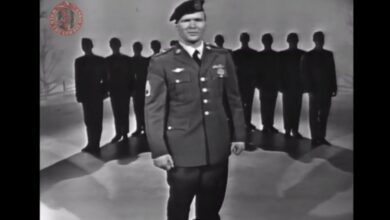Struggled to speak, sang oh, my; 46 years on, it still resonates.
Elvis Presley is widely regarded as a symbol of charisma and talent, leaving an indelible mark on both music and popular culture. Born on January 8, 1935, in Tupelo, Mississippi, he rose from humble beginnings to achieve global fame. His unique blend of rock, pop, blues, and gospel music set a new standard for future artists, while his remarkable voice and magnetic stage presence secured his place in music history. Growing up in a financially challenged family during the Great Depression, Presley was influenced by the diverse sounds of the Southern United States, which laid the groundwork for his innovative approach that combined rhythm and blues with country and gospel.
Music played a significant role in Presley’s early life; his family often sang together in church, and his mother, Gladys, was instrumental in fostering his musical passion. As a teenager, he immersed himself in the lively rhythms of local Black communities, listening to radio broadcasts featuring blues and gospel artists. These varied influences formed the basis of his distinct musical style. In 1948, moving to Memphis, Tennessee, placed him in a vibrant musical environment ripe for exploration. The city, a hotspot for early rock and roll, led him to record at Sun Records, where his groundbreaking sound quickly captured the attention of record producers.
As a central figure in the 1950s cultural milieu—an era defined by youthful rebellion—Presley’s early recordings at Sun Records, such as “That’s All Right” and “Blue Moon of Kentucky,” demonstrated his talent for merging different musical genres, attracting a diverse fanbase. His breakout single, “Heartbreak Hotel,” resonated profoundly with listeners, launching a series of hits that earned him the moniker “King of Rock and Roll.” His rebellious spirit and embodiment of the era significantly contributed to his iconic status, helping break down cultural and racial barriers.
In the 1960s, Presley expanded his career by diving into films, starring in a succession of successful movies that showcased his musical talents. Titles like “Jailhouse Rock,” “Blue Hawaii,” and “Viva Las Vegas” became cultural milestones, broadening his impact beyond the realm of music. Despite his Hollywood success, his true passion remained in music. The late 1960s and early 1970s ushered in a revival of his artistic vision, culminating in the legendary 1968 Comeback Special, which reenergized his career. This performance showcased his vocal power as he infused older hits with renewed vigor, reestablishing himself as a dominant presence in the entertainment industry.
However, the pressures of fame and personal challenges took a toll on Presley’s health over the years. His marriage to Priscilla faced difficulties, ultimately leading to their divorce in 1973, which deeply affected him. As he grappled with personal struggles and the relentless demands of touring and recording, his reliance on prescription medications grew, contributing to a decline in his physical well-being. Despite these obstacles, his passion for performing remained unwavering. He continued to tour, enchanting audiences with his electrifying stage presence, even as his health deteriorated. Often, he performed with a vigor that concealed his struggles, underscoring the profound bond he shared with his music and fans.
In the months leading to his untimely death, the challenges he faced became more apparent, both on and off stage. The “Elvis in Concert” television special captured moving moments of his artistry, despite the visible strain during performances. Fans noted that while his health was waning, the quality of his vocals still reflected the brilliance of his earlier years. This contrast presented a portrait of a dedicated artist, committed to his craft and his audience, even amidst overwhelming personal trials. Such dedication remains a source of inspiration and offers a sobering glimpse into the complexities of his life behind the scenes.
The response to his final concerts illustrated the multifaceted nature of Elvis’s legacy. Many fans nostalgically reminisced about the height of his career, celebrating the vibrant energy he exuded, while others expressed concern for his health during his later years, recognizing the challenges he faced, yet appreciating the emotional depth he infused into his performances. On platforms dedicated to his memory, fans share stories of how his music impacted their lives, highlighting the profound influence he holds across generations. Despite his struggles, his lasting significance in music history attests to the timeless nature of his artistry.
Presley’s premature death at the age of 42 shocked the world and left an unfillable void in the music industry. His funeral drew thousands of mourners, reflecting his immense influence on American culture and music. The widespread grief from fans and fellow artists alike underscored the love and admiration people held for him, solidifying his status as a cultural icon. Numerous artists across generations have credited him as a major influence, and his legacy continues to resonate in music, style, and social attitudes today. Tributes to him abound, celebrating his contributions and offering insights into his complex character.
Elvis’s life story also serves as a cautionary tale about the pressures of fame and the importance of mental health awareness. His journey through triumphs, personal victories, and significant obstacles imparts critical lessons about the necessity of support systems and the dangers of addiction. Contemporary discussions surrounding celebrity culture often reference Elvis’s life, using it as a springboard for broader conversations about mental health, fame, and the consequences of living under public scrutiny. His struggles resonate with current dialogues regarding the pressures faced by public figures, positioning him as a symbol of both achievement and caution.
Elvis Presley’s music and persona continue to captivate audiences; his songs are frequently aired on radio stations and celebrated in tributes worldwide. The Elvis phenomenon has grown over the years, with numerous impersonators honoring him in shows, and his influence is apparent in many contemporary artists who regard him as a primary inspiration. His estate, Graceland, now functions as a museum and pilgrimage site for fans wanting to connect with the legacy of the man who forever transformed the music landscape. Visits to Graceland provide an intimate look into his life and career, fostering a deeper appreciation for his artistic contributions.
Ultimately, Elvis Presley is remembered not only for his unforgettable melodies and rhythms but also for his authenticity, charisma, and ability to evoke profound emotions through his music. The scope of his work, ranging from heartfelt ballads to energetic rock anthems, showcases his versatility and passion. While his film career may have been secondary to his music, it still offered a canvas for creative expression, allowing audiences to appreciate him in various contexts. As fans reflect on his life and music, they continue to celebrate the lasting power of his voice and artistry—a legacy that transcends time and generational boundaries. His significant contributions to music and culture will forever be etched in history, ensuring he remains a cherished figure for years to come.





